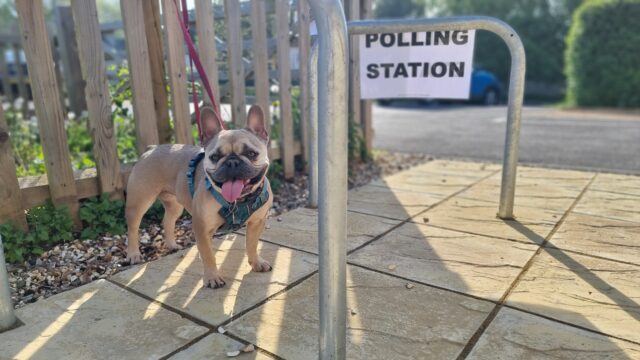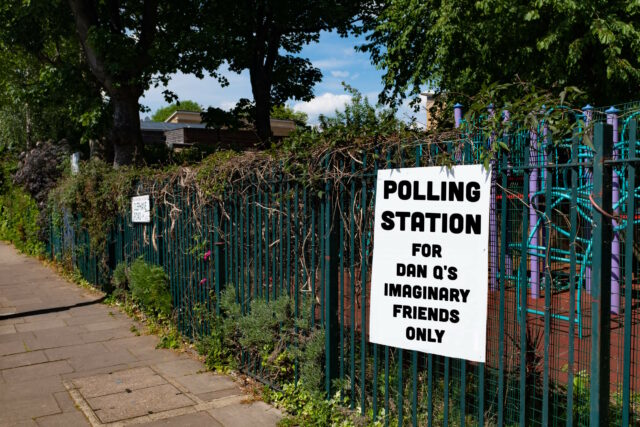My contribution to the long-standing British tradition of photographing dogs at polling stations. Don’t forget to vote, folks!
Tag: elections
Council Disenfranchisement
Like much of the UK, there are local elections where I live next month. After coming home from a week of Three Rings volunteering I found my poll card on the doormat. Can you spot the bleeding-obvious mistake?
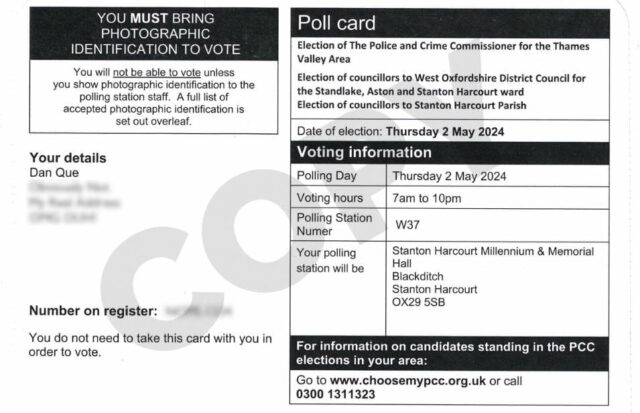
This’ll be the first election for which I’ve needed to bring photographic ID to the polling station. That shouldn’t be a problem: I have a passport and driving license and whatnot.
But just to be absolutely certain, I had the local council – the same people who issued me the polling card! – supply me with a voter authority certificate:
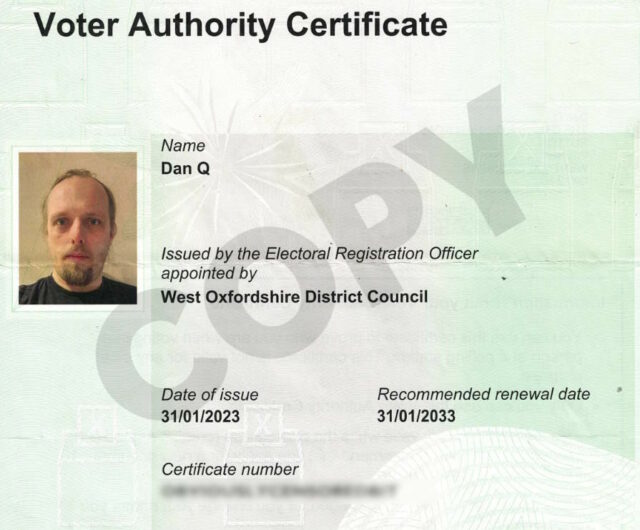
So now I’m in a pickle. West Oxfordshire District Council are asking me to produce photo ID in the wrong name when I turn up at a polling station next month. It doesn’t even match the name on the photo ID that they themselves issued me.
This would be less-infuriating were it not for the fact that they had my name wrong in the same way on an electoral roll form they sent me in August 20221. When I contacted them to have them fix it, they promised that the underlying problem was solved2 so this very thing wouldn’t happen.
And yet here we are.
Hopefully they’ll be able to fix their records promptly or else I guess I’ll have to apply for a proxy vote, to allow the ballot of my imaginary friend “Dan Que” to be cast by me, Dan Q, instead.
And if that isn’t the most bizarre form of election fraud you’ve ever heard of, I don’t know what is.
Update: True to their word, the council had managed to correct their records by the time I reached the polling station this morning. It’s still a little annoying that they somehow mucked it up in the first place, but I appreciate the efficiency with which they corrected their mistake.
Footnotes
1 They’d had my name right before August 2022, including on previous poll cards; I can only assume that some human operator “corrected” it to the wrong thing at some point.
2 They didn’t fix the problem immediately in August 2022. Initially, they demanded that I produce proof of my change of name from “Dan Que” (which has, of course, never been my name!) to “Dan Q”, and only later backed down and admitted that they’d made a mistake and would correct the PII they were holding about me.
How Few Votes Can Win a UK General Election?
Here’s a thought: what’s the minimum number of votes your party would need to attract in order to be able to secure a majority of seats in the House of Commons and form a government? Let’s try to work it out.
The 2017 general election reportedly enjoyed a 68.8% turnout. If we assume for simplicity’s sake that each constituency had the same turnout and that votes for candidates other than yours are equally-divided amongst your opposition, that means that the number of votes you need to attract in a given constituency is:
68.8% × the size of its electorate ÷ the number of candidates (rounded up)
For example, if there was a constituency of 1,000 people, 688 (68.8%) would have voted. If there were 3 candidates in that constituency you’d need 688 ÷ 3 = 229⅓, which rounds up to 230 (because you need the plurality of the ballots) to vote for your candidate in order to secure the seat. If there are only 2, you need 345 of them.
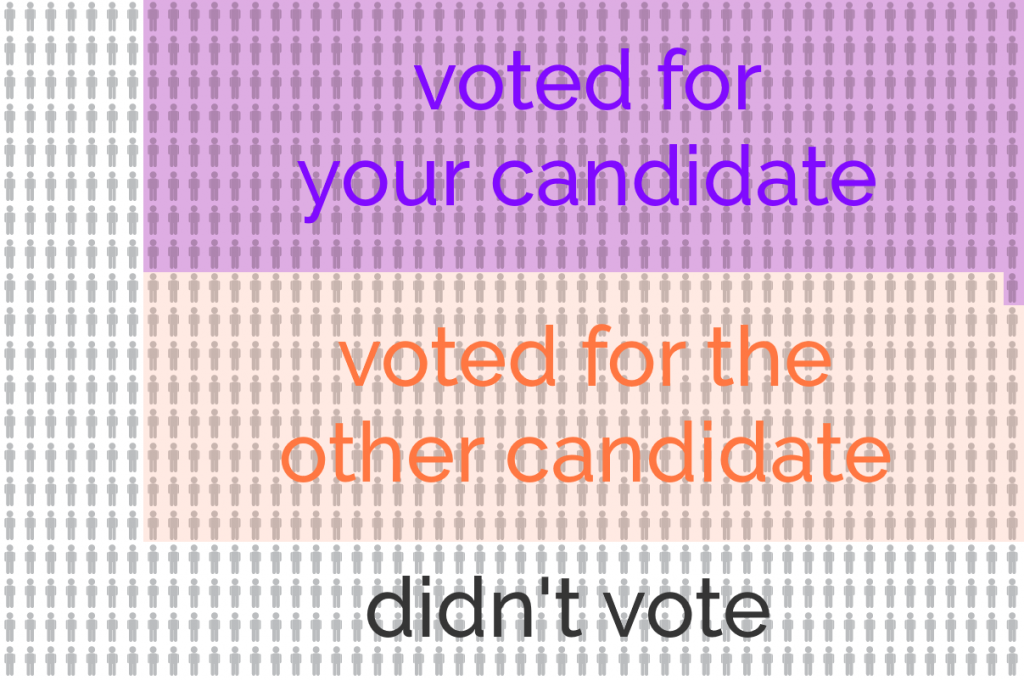
The minimum number of votes you’d need would therefore be this number for each of the smallest 326 constituencies (326 is the fewest number of seats you can hold in the 650-seat House of Commons and guarantee a strict majority; in reality, a minority government can sometimes form a government but let’s not get into that right now). Constituencies vary significantly in size, from only 21,769 registered voters in Na h-Eileanan an Iar (the Western Isles of Scotland, an SNP/Labour marginal) to 110,697 in the Isle of Wight (which flip-flops between the Conservatives and the Liberals), but each is awarded exactly one seat, so if we’re talking about the minimum number of votes you need we can take the smallest 326.
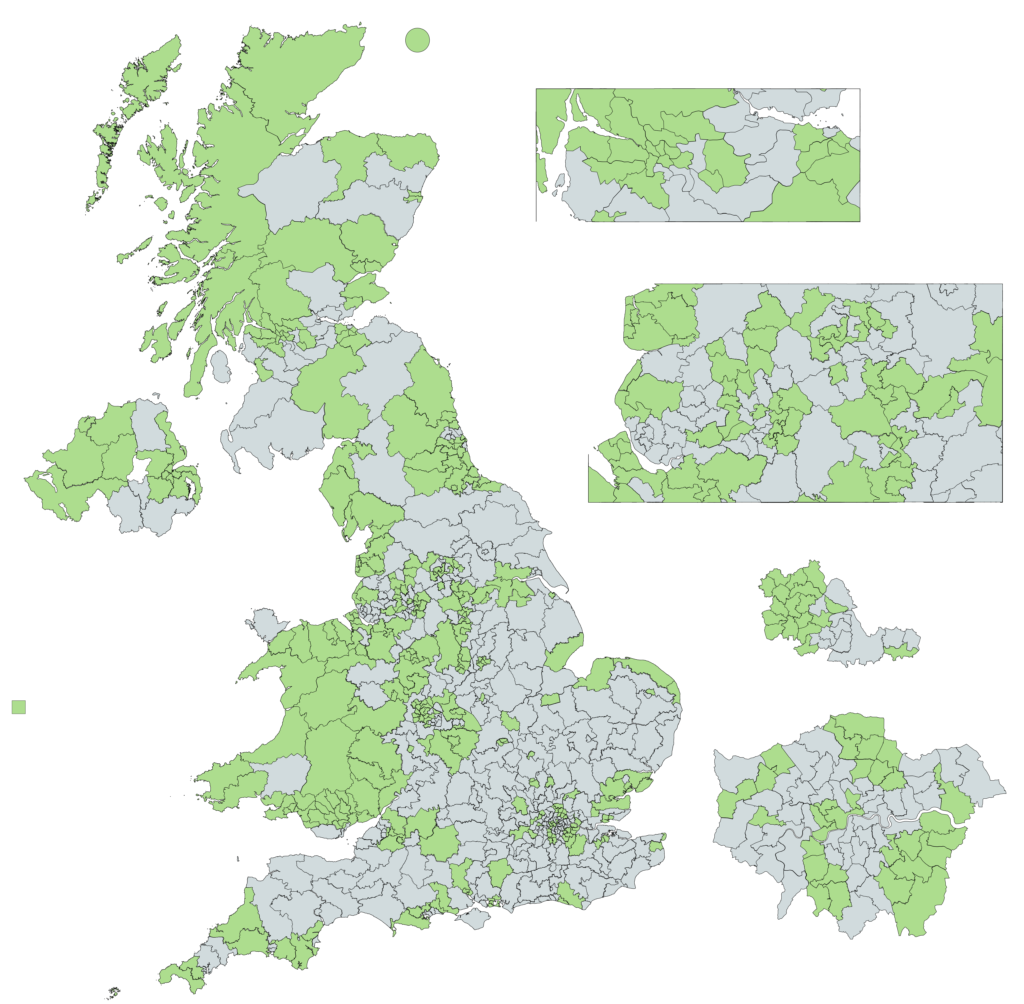
By my calculation, with a voter turnout of 68.8% and assuming two parties field candidates, one can win a general election with only 7,375,016 votes; that’s 15.76% of the electorate (or 11.23% of the total population). That’s right: you could win a general election with the support of a little over 1 in 10 of the population, so long as it’s the right 1 in 10.
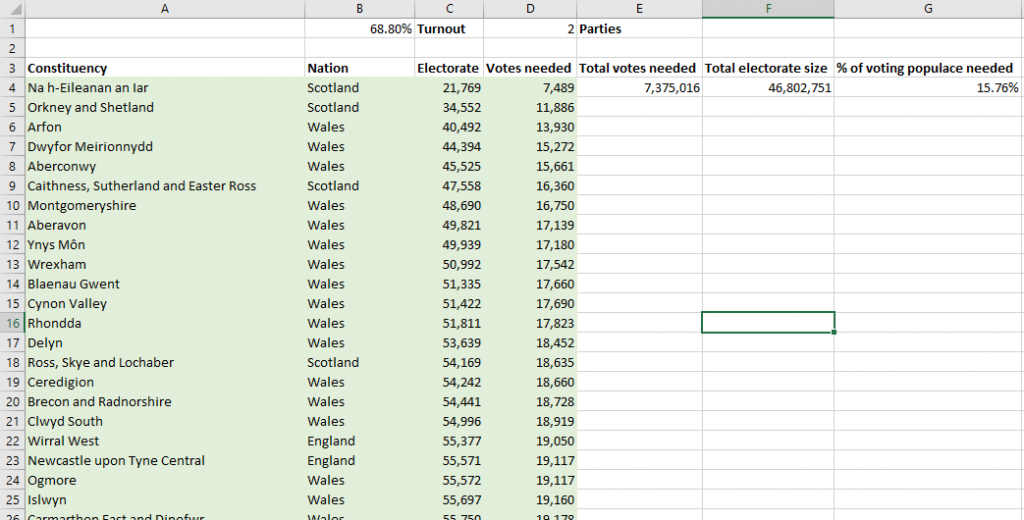
I’ll leave you to decide how you feel about that. In the meantime, here’s my working (and you can tweak the turnout and number-of-parties fields to see how that affects things). My data comes from the following Wikipedia/Wikidata sources: [1], [2], [3], [4], [5] mostly because the Office of National Statistics’ search engine is terrible.
Gerrymandering
This is a repost promoting content originally published elsewhere. See more things Dan's reposted.
How the manipulation of boundaries can adjust voting outcomes.
On This Day In 2005
Looking Back
On this day in 2005 (actually tomorrow, but I needed to publish early) I received an unusual parcel at work, which turned out to contain a pan, wooden spoon, tin of spaghetti hoops, loaf of bread… and an entire electric hob.

This turned out, as I describe in my blog post of the day, to have been the result of a conversation that the pair of us had had on IRC the previous day, in which he called me a “Philistine” for heating my lunchtime spaghetti hoops in the office microwave. This was a necessity rather than a convenience, given that we didn’t have any other mechanism for heating food (other than a toaster, and that’s a really messy way to heat up tinned food…).
It was a different time: a time when the lives of many of my friends were still centered around academic persuits (Siân was working on and handing in her dissertation, as was Liz, Claire was getting results back, Ruth was stressed out by a useless student on her team, Paul took things too far, and even JTA was suffering: struggling with his wordcount of an essay that he considered handing in late). It was a time when our evenings were being consumed watching Knightmare (my blog posts mentioning: the first series, first half of second series, second half of second series, Ruth’s commentary) or at the Ship & Castle (both, sadly, without Sian). It was a time when Andy worked at the cafe under The Flat, like we were all in some kind of sitcom or something.
It was clearly a time when we were all blogging quite regularly: apologies for the wall of links (a handful of which, I’m afraid, might be restricted). Be glad that I spared you all the posts about the 2005 General Election, which at the time occupied a lot of the Abnib blogosphere. We were young, and idealistic, and many of us were students, and most of us hadn’t yet been made so cynical by the politicians who have come since.

And, relevantly, it was a time when Paul was able to express his randomness in some particularly quirky ways. Like delivering me a food parcel at work. He’s always been the king of random events, like organising ad-hoc hilltop trips that turned out to be for the purpose of actually releasing 99 red (helium) balloons. I tried to immortalise his capacity for thinking that’s not just outside the box, but outside the known Universe, when I wrote his character into Troma Night Adventure, but I’m not sure I quite went far enough.
Looking Forward
It seems so long ago now: those Aberystwyth days, less than a year out of University myself. When I look back, I still find myself wondering how we managed to find so much time to waste on categorising all of the pages on the RockMonkey wiki. I suppose that nowadays we’ve traded the spontaneity to say “Hey: card games in the pub in 20 minutes: see you there!” on a blog and expect it to actually work, for a more-structured and planned existence. More-recently, we’ve spent about a fortnight so far discussing what day of the week we want out new monthly board games night to fall on.
There’s still just enough of the crazy random happenstances in my life, though. As I discovered recently, when I once again received an unusual and unexpected parcel in the post. This time, it wasn’t from Paul, but from Adam, who’d decided to respond in a very literal fashion to my tongue-in-cheek suggestion that he owed me tea, and a keyboard.
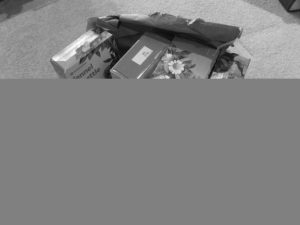
I got the chance to live with Paul for a couple of years, until he moved out last month. I’m not sure whether or not this will ultimately reduce the amount of quirkiness that I get in my diet, but I’m okay either way. Paul’s not far away – barely on the other side of town – so I’m probably still within a fatal distance of the meteor we always assumed would eventually kill him.
We’ve turned what was his bedroom into an office. Another case of “a little bit less random, a little bit more structure and planning”, perhaps, in a very metaphorical way? Maybe this is what it feels like to be a grown-up. Took me long enough.
This blog post is part of the On This Day series, in which Dan periodically looks back on years gone by.
Cool Thing Of The Day
Cool And Interesting Thing Of The Day To Do At The University Of Wales, Aberystwyth, #40:
Fail to get elected as one of the two student representatives of module CS12320 (Concepts In Programming). What else could I expect? I was nominated against my will, gave an awe-inspiring speech, that declared that “if I get this position, I’ll slaughter every last one of you with a pick-axe” brought up the issue that “hell – I’m not even representative of myself; why do you want me to represent you lot?”, and made clear “I want this role as little as you want me to have it!”. I think they got the idea. I recieved a grand total of 0 votes, and that includes the ones from the people who nominated me (who, after hearing my speech, voted for somebody else). Victory
The ‘cool and interesting things’ were originally published to a location at which my “friends back home” could read them, during the first few months of my time at the University of Wales, Aberystwyth, which I started in September 1999. It proved to be particularly popular, and so now it is immortalised through the medium of my weblog.
